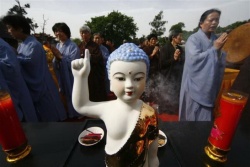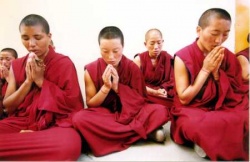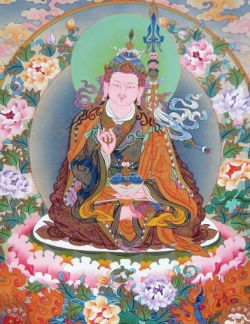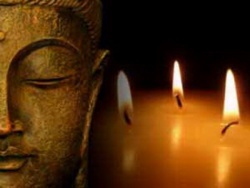The Guru-Disciple Relationship – Advice by HH the Dalai Lama
Tibetan Buddhism :: Struggling With DiffiCult Issues
Controversy: New Kadampa Tradition, Dorje Shugden, Sogyal Rinpoche : : Tibet & Dalai Lama ::
The Guru-Disciple Relationship – Advice by HH the Dalai Lama
February 21, 2013 by tenpel 29 Comments
In “Healing Anger – The power of patience from a Buddhist perspective” pub. Snow Lion, USA 1997, pp 83-85, H.H. the Dalai Lama, Tenzin Gyatso, states:
Q: What do you think about Dharma teachers who speak and write about Dharma beautifully, but do not live it?
A: Because Buddha knew of this potential consequence, he was very strict in prescribing the qualities that are necessary for a person to be qualified as a teacher. Nowadays, it seems, this is a serious issue.
First on the teacher’s side: the person who gives some teaching, or gives talks on Dharma must have really trained, learned, and studied.
Then, since the subject is not history or literature, but rather a spiritual one, the teacher must gain some experience.
Then when that person talks about a religious subject with some experience, it carries some weight.
Otherwise, it is not so effective. Therefore, the person who begins to talk to others about the Dharma must realize the responsibility, must be prepared.
That is very important.
Because of this importance, Lama Tsongkhapa, when he describes the qualifications that are necessary for an individual to become a teacher, quotes from Maitreya’s Ornament of Scriptures,
in which Maitreya lists most of the key qualifications that are necessary on the part of the teacher, such as that the teacher must be disciplined, at peace with himself, compassionate, and so on.
At the conclusion, Lama Tsongkhapa sums up by stating that those who wish to seek a spiritual teacher must first of all be aware of what the qualifications are that one should look for in a teacher.
Then, with that knowledge, seek a teacher.
Similarly, those who wish to seek students and become teachers must not only be aware of these conditions, but also judge themselves to see whether they possess these qualities, and if not, work towards possessing them.
Therefore, from the teachers’ side, they also must realize the great responsibility involved.
If some individual, deep down, is really seeking money, then I think it is much better to seek money through other means.
So if the deep intention is a different purpose, I think this is very unfortunate.
Such an act is actually giving proof to the Communist accusation that religion is an instrument for exploitation. This is very sad.
Buddha himself was aware of this potential for abuse. He therefore categorically stated that one should not live a way of life which is acquired through five wrong means of livelihood.
One of them is being deceptive and flattering toward one’s benefactor in order to get maximal benefit.
Now, on the students’ side, they also have responsibility.
First, you should not accept the teacher blindly.
This is very important. You see, you can learn Dharma from someone you accept not necessarily as a guru, but rather as a spiritual friend.
Consider that person until you know him or her very well, until you gain full confidence and can say, “
Now, he or she can be my guru.” Until that confidence develops, treat that person as a spiritual friend.
Then study and learn from him or her. You also can learn through books, and as time goes by, there are more books available.
So I think this is better.
Here I would like to mention a point which I raised as early as thirty years ago about a particular aspect of the guru-disciple relationship.
As we have seen with Shantideva’s text Guide to the Bodhisatva’s Way of Life, we find that in a particular context certain lines of thought are very much emphasized, and unless you see the argument in its proper context there is a great potential for misunderstanding.
Similarly, in the guru-disciple relationship, because your guru plays such an important role in serving as the source of inspiration, blessing, transmission, and so on, tremendous emphasis is placed on maintaining proper reliance upon and a proper relationship with one’s guru.
In the texts describing these practices we find a particular expression, which is, “May I be able to develop respect for the guru, devotion to the guru, which would allow me to see his or her every action as pure.”
I stated as early as thirty years ago that this is a dangerous concept.
There is a tremendous potential for abuse in this idea of trying to see all the behaviors of the guru as pure, of seeing everything the guru does as enlightened. I have stated that this is like a poison. To some Tibetans, that sentence may seem a little bit extreme.
However, it seems now, as time goes by, that my warning has become something quite relevant.
Anyway, that is my own conviction and attitude, but I base the observation that this is a potentially poisonous idea on Buddha’s own words.
For instance, in the Vinaya teachings, which are the scriptures that outline Buddha’s ethics and monastic discipline, where a relationship toward one’s guru is very important, Buddha states that although you will have to accord respect to your guru,
if the guru happens to give you instructions which contradict the Dharma, then you must reject them.
There are also very explicit statements in the sutras, in which Buddha states that any instructions given by the guru that accord with the general Dharma path should be followed, and any instructions given by the guru that do not accord with the general approach of the Dharma should be discarded.
It is in the practice of Highest Yoga Tantra of Vajrayana Buddhism where the guru-disciple relationship assumes great importance.
For instance, in Highest Yoga Tantra we have practices like guru yoga, a whole yoga dedicated toward one’s relation to the guru.
However, even in Highest Yoga Tantra we find statements which tell us that any instructions given by the guru which do not accord with Dharma cannot be followed.
You should explain to the guru the reasons why you can’t comply with them, but you should not follow the instructions just because the guru said so.
What we find here is that we are not instructed to say,
“Okay, whatever you say, I will do it,” but rather we are instructed to use our intelligence and judgment and reject instructions which are not in accord with Dharma.
However we do find, if we read the history of Buddhism, that there were examples of single-pointed guru devotion by masters such as Tilopa, Naropa, Marpa, and Milarepa which may seem a little extreme.
But we find that while these masters, on the surface, may look like outcasts or beggars, or they may have strange behaviors which sometimes lead other people to lose faith, nevertheless when the necessity came for them to reinforce other people’s faith in the Dharma and in themselves as spiritual teachers, these masters had a counterbalancing factor – a very high level of spiritual realization.
This was so much so that they could display supernatural powers to outweigh whatever excesses people may have found in them, conventionally speaking.
However, in the case of some of the modern-day teachers, they have all the excesses in their unethical behaviours but are lacking in this counterbalancing factor, which is the capacity to display supernatural powers. Because of this, it can lead to a lot of problems.
Therefore, as students, you should first watch and investigate thoroughly. Do not consider someone as a teacher or guru until you have certain confidence in the person’s integrity. This is very important.
Then, second, even after that, if some unhealthy things happen, you have the liberty to reject them. Students should make sure that they don’t spoil the guru. This is very important.
In “The Gelug/Kagyu Tradition of Mahamudra”, pp. 209–211, His Holiness the Dalai Lama states:
Premature Commitment To An Unsuitable Guru
In some cases it happens that disciples do not examine a spiritual teacher very carefully before accepting him or her as their guru and committing themselves to a guru/disciple relationship. They may even have received tantric empowerments from this teacher.
But then they find they were wrong. They see many flaws in this teacher and discover many serious mistakes he or she has made.
They find that this teacher does not really suit them. Their minds are uneasy regarding this person and they are filled with doubts and possibly regret.
What to do in such a circumstance?
The mistake, of course, is that originally the disciples did not examine this teacher very carefully before committing themselves to him or her. But this is something of the past that has already happened.
No one can change that. In the future, of course, they must examine any potential guru much more thoroughly.
But, as for what to do now in this particular situation with this particular guru, it is not productive or helpful to continue investigating and scrutinizing him or her in terms of suspicions or doubts. Rather, as The Kalachakra Tantra recommends, it is best to keep a respectful distance.
They should just forget about him or her and not have anything further to do with this person.
It is not healthy, of course, for disciples to deny serious ethical flaws in their guru, if they are in fact true, or his or her involvement in Buddhist power-politics, if this is the case.
To do so would be a total loss of discriminating awareness.
But for disciples to dwell on these points with disrespect, self-recrimination, regret or other negative attitudes is not only unnecessary, unhelpful and unproductive, it is also improper.
They distance themselves even further from achieving a peaceful state of mind and may seriously jeopardize their future spiritual progress.
I think it best in this circumstance just to forget about this teacher. Premature Commitment To Tantra And Daily Recitation Practices
It may also occur that disciples have taken tantric empowerments prematurely, thinking that since tantra is famous as being so high, it must be beneficial to take this initiation.
They feel they are ready for this step and take the empowerment, thereby committing themselves to the master conferring it as now being their tantric guru.
Moreover, they commit themselves as well to various sets of vows and a daily recitation meditation practice.
Then later these disciples realize that this style of practice does not suit them at all, and again they are filled with doubts, regrets, and possibly fear.
Again, what to do?
We can understand this with an analogy.
Suppose, for instance, we go to a store, see some useful but exotic item that strikes our fancy and just buy it on impulse, even though it is costly.
When we bring it home, we find, after examining the item more soberly now that we are out of the exciting, seductive atmosphere of the marketplace, that we have no particular use for it at the moment.
In such situation, it is best not to throw the thing out in the garbage, but rather to put it aside. Later we might find it, in fact, very useful.
The same conclusion applies to the commitments disciples have taken prematurely at a tantric empowerment without sufficient examination to determine if they were ready for them.
In such situations, rather than deciding that they are never going to use it at all and throwing the whole thing away, such disciples would do better to establish a neutral attitude toward it, putting tantra and their commitments aside and leaving it like that.
This is because they may come back to them later and find them very precious and useful.
Suppose, however, disciples have taken an empowerment and have accepted the commitment to practice the meditations of a particular Buddha-form by reciting a sadhana, a method of actualization, to guide them through a complex sequence of visualization and mantra repetition.
Although they still have faith in tantra, they find that their recitation commitment is too long and it has become a great burden and strain to maintain it as a daily practice.
What to do then? Such disciples should abbreviate their practice.
This is very different from the previous case in which certain disciples find that tantric practice in general does not suit them at the present stage of their spiritual life.
Everyone has time each day to eat and to sleep.
Likewise, no matter how busy they are, no matter how many family and business responsibilities they may have, such disciples can at least find a few minutes to maintain the daily continuity of generating themselves in their imagination in the aspect of a Buddha-form and reciting the appropriate mantra.
They must make some effort. Disciples can never progress anywhere on the spiritual path if they do not make at least a minimal amount of effort.
In “The Gelug/Kagyu Tradition of Mahamudra”, pp. 185–186, His Holiness the Dalai Lama states about
The Root Guru
Sometimes we differentiate a root guru from our other gurus and focus particularly on him or her for our practice of guru-yoga. Our root guru is usually described in the context of tantra as the one who is kind to us in three ways.
There are several manners of explaining these three types of kindness. One, for example, is the kindness to confer upon us empowerments, explanatory discourses on the tantric practices and special guideline instructions for them.
If we have received empowerments and discourses from many gurus, we consider as our root guru the one who has had the most beneficial effect upon us.
For deciding this, we do not examine in terms of the actual qualifications of the guru from his or her own side, but rather in terms of our own side and the benefit we have gained in our personal development and the state of mind this guru elicits in us. We consider the rest of our gurus as emanations or manifestations of that root guru …













